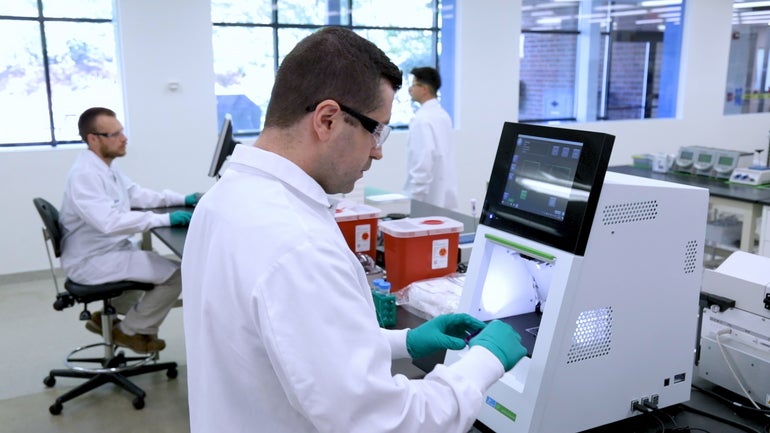With the state’s commitment to the life sciences sector still tied up in an inter-branch dispute among Democrats, industry leaders acknowledged challenges on Tuesday including a record vacancy rate for lab space in Massachusetts, slower job growth, and a decrease in venture capital funding.
The MassBio trade group, in a new “industry snapshot,” argued the headwinds are tempered by net job growth, the state’s prowess in the drug development pipeline, and regional expansion of the sector beyond Cambridge.
MassBio CEO Kendalle Burlin O’Connell wrote Massachusetts is “on the verge of making another commitment to the life sciences,” without delving into lawmakers’ failure to strike a deal on a sweeping economic development bill containing commitments to the sector. The Senate favored a smaller, shorter-term reauthorization of the life sciences initiative, compared to the approach backed by Gov. Maura Healey and approved in the House to inject roughly $1 billion into the sector over a 10-year period.
“As we release this report, Governor Healey and legislative leaders continue to work together to finalize a reauthorization of the Life Sciences Initiative, which would deliver the tools needed to expand this industry’s reach and impact,” Burlin O’Connell wrote.
House Speaker Ron Mariano and Senate President Karen Spilka have pledged to bring back lawmakers for a special session once a deal is struck on the economic development package, though it is unclear what progress negotiators have made in recent weeks. Burlin O’Connell earlier this month said that approving a “Life Sciences Initiative for another full $1 billion over the next decade as part of a broader package is an appropriate recognition that the state’s competitiveness and economic well-being are at stake.”
Mariano, in a statement in the report, called the biopharma industry a “major driver of our economy.” Rep. Ann-Margaret Ferrante is also quoted in the report, but not Spilka.
“Advancing innovation in health care is what the Commonwealth does better than anywhere else in the world because of the people, institutions, and companies that call Massachusetts home,” Mariano said. “I’m proud of the role the House of Representatives has historically played in making investments in this very successful public-private partnership. This type of collaboration will ensure the Commonwealth continues to deliver for residents and communities through jobs and tax revenues, as well as the patients who need the lifesaving medicines being developed in local labs.”
Massachusetts gained almost 3,000 biopharma net new jobs in 2023, bringing the industry’s total workforce to nearly 117,000, according MassBio’s report. The workforce grew by 2.6 percent, compared to 6.9 percent the prior year.
The report notes that “economic and industry headwinds stalled Massachusetts’ push to grow the biomanufacturing sector, with a loss of just over 2% of the workforce.”
New Jersey, North Carolina and Florida all managed to grow their biomanufacturing workforces, though MassBio says “this increase remains in large batch manufacturing, not the making of advanced precision medicines where Massachusetts stands to grow in the coming years.”
Takeda is the commonwealth’s largest biopharma employer, with just over 6,200 workers, according to the report. The company earlier this year revealed plans to lay off 146 workers in Lexington and 495 workers in Cambridge, and that it terminated an agreement with the state for tax incentives contingent on Takeda creating new jobs.
Watertown-based gene editing startup Tome Bioscience, Inc. plans to lay off 131 workers between Nov. 1 and Nov. 14, according to a new filing with the state under the Worker Adjustment and Retraining Act. That accounts for nearly all of the company’s staff, according to The Boston Globe.
There’s a 16 percent vacancy rate for lab space statewide, which MassBio says is an all-time high.
“As the funding environment changes, companies will be able to scale here in a tenant-favored market,” Burlin O’Connell wrote.
Near the MBTA’s Riverside station in Newton, developers for a major project have scrapped initial plans to incorporate life sciences space into a mixed-use complex that’s now focused on housing in its initial phase.
“The life sciences development world has not improved at all, and so we’ve been reconsidering the project with the developer with a number of goals in mind,” MBTA Chief Real Estate Officer Richard Henderson told the agency’s board of directors last week.
Massachusetts-headquartered companies secured $3.26 billion of venture capital funding in the first two quarters of 2024, which MassBio says is the lowest total since 2019. It also marks a 12.6 percentage drop from the first half of 2023, according to the report.
Still, Massachusetts trails only California in terms of national venture capital funding, MassBio says.
Sixty-five percent of venture dollars in the first half of 2024 flowed to companies outside of Cambridge, including 21 percent to Boston, 20 percent to Waltham, 9 percent to Watertown and 4 percent to Framingham.
Massachusetts saw increased merger and acquisition activity in the first half of 2024.
MassBio says 17 Massachusetts companies were acquired for a “disclosed total” of $28.9 billion, compared to 11 deals for $10.5 billion over the same time period in 2023. Meanwhile, Massachusetts companies acquired 16 companies for a “disclosed total” of $9.73 billion, compared to seven deals for $649 million over the same time period in 2023.
The report describes the commonwealth as a “global leader” in advanced therapies, including cell and gene therapy.
Massachusetts accounts for 15.2 percent of the country’s drug development pipeline as of mid-July, trailing California’s 26 percent share, according to the report. Meanwhile, Massachusetts’ pipeline for advanced therapies surpasses China and competitor states like California.
“Massachusetts is where life science ideas are discovered, developed, and scaled every day,” Economic Development Secretary Yvonne Hao said in the report. “We are the global hub for healthcare and life science innovation thanks to our best-in-class talent and pioneering startups and companies that employ more than 116,000 people in rewarding, high-paying jobs. It’s critical that the state continues to support this key sector and lengthen our lead.”

